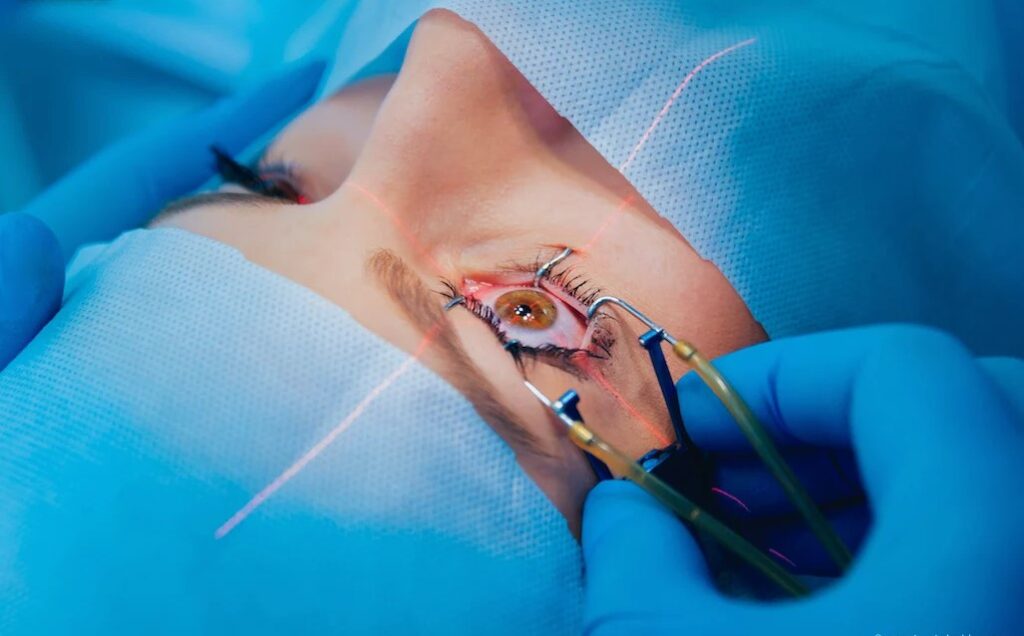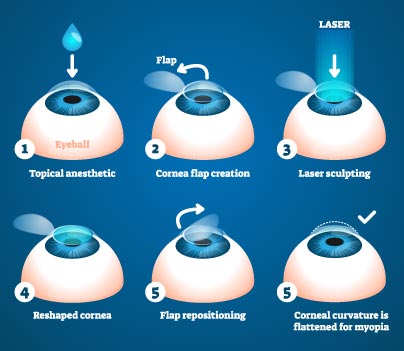Cataract
Lasik


- You must inform your eye doctor about any ongoing medications before the Cataract surgery.
- It is important to discuss your current medical condition (if any) with the concerned eye specialist to avoid any complications during the procedure.
- It is not advisable to smoke or consume tobacco before the surgery.
- Inform your doctor if you have a history of allergies related to anesthesia.
- Do not eat or drink 8 to 9 hours prior to the surgery. Doctors generally recommend skipping dinner or refraining from eating anything after midnight.
Most cataract surgery is done on an outpatient basis. However, the eye doctor may keep you under observation after the surgery to reduce the risk of any complications. Here is what you can expect right after your cataract surgery –
- You may not feel a little sensation for a couple of hours in the eye after the surgery. The surgeon places an eye patch for the operated eye or suggests glasses for protection against dust, dirt, wind, sunlight, etc. to prevent the eye from irritation.
- You may experience blurry vision at first when you’ll remove the protective shield. The eye takes some time to heal and adjust with the lens initially.
- The colors may seem brighter after the surgery as you will be looking through a new, clear artificial lens.
- Some patients also experience mild itching or discomfort in the eye a few days after the surgery. Avoid rubbing or pushing your eyes until itching remains.
- The eye doctor will ensure the lens has adjusted well and your eye is healing properly. You may have to regularly visit the doctor for a follow-up session.
- The doctor will prescribe some medications and eye drops to prevent eye infections or reduce inflammation. Keep in touch with your eye specialist for a regular eye checkup.
Since cataracts cannot be treated using non-surgical methods, the surgical method is the only effective treatment method to remove cataracts. Therefore, if you are experiencing blurry vision due to a cataract, you must immediately get it treated. If your cataract is making it difficult for you to carry out your daily tasks such as driving, reading, watching television, cooking, etc. then you should definitely seek medical assistance. Consult your eye doctor if the following symptoms persist for a longer duration of time –
- Blurred or clouded vision
- Inability to see at night
- Sensitivity to light and glare
- Difficulty in reading
- Halos around lights
- Fading colors or yellowish vision
- Double vision
Most patients with refractive errors benefit from LASIK treatment. LASIK or Laser In-Situ Keratomileusis is a painless procedure that uses the latest laser technology and high-quality intraocular lenses (IOLs) to ensure negligible chances of complications. There are several benefits of LASIK surgery for both medical as well as aesthetic reasons. Some of the advantages of LASIK surgery are as follows –
- Around 96% of patients regain their vision
- Cures refractive errors like myopia, hyperopia, and astigmatism
- Minimally invasive procedure
- No visible cuts or scars
- No major pain as compared to other surgeries
- Negligible chances of risks and complications
- Permanently eliminates the need for glasses or contact lenses after the procedure
LASIK surgery is done to treat vision problems due to refractive errors. While some patients undergo LASIK for aesthetic purposes, people with refractive errors usually benefit from the surgery the most. Contact the eye specialist for your LASIK surgery if you are experiencing the following –
- Myopia
- Hypermetropia
- Astigmatism
- Vision problems
- Can’t focus with one or both eyes.
- Frequent headaches due to squinting of an eye
- Constant and intense eye pain
- Sensitive to light
- Dry or itchy eyes
- Seeing spots, floaters, or flashes n the field of vision
The eyes start recovering right after the LASIK surgery and the initial healing occurs rapidly. You may experience blurry vision right after the surgery which usually stabilizes within 24-48 hours. However, it is advisable that you follow specific instructions for at least a month to ensure no risk of complications until complete recovery.
You will be able to resume daily activities once the flap heals completely. However, it is important to visit the doctor for follow-up sessions to monitor your recovery. In addition, the doctor may provide certain instructions or recovery tips after the surgery to help with the recovery. Some of the recovery tips are as follows –
- Avoid swimming or exposing water to the eyes during the entire recovery period.
- Avoid taking part in any contact sports as this increases the chances of infection or injury.
- Stop smoking and limit alcohol consumption.
- Avoid driving until the doctor says so.
- Avoid direct exposure to sunlight.
- Eat healthy and fresh fruits and vegetables.
- Don’t expose the operated eye to dust or heavy winds for at least a week.
- Don’t watch excessive television as it can put a strain on the eyes.

A. The following patients are not ideal candidates for LASIK surgery –
- Patients who are below 18 years of age.
- People suffering from diabetes.
- Individuals who are suffering from cataracts, keratoconus, and glaucoma.
- Pregnant or lactating women
- Patients who are suffering from conditions like dry eyes.
- People with corneal thickness less than 0.5 mm.
